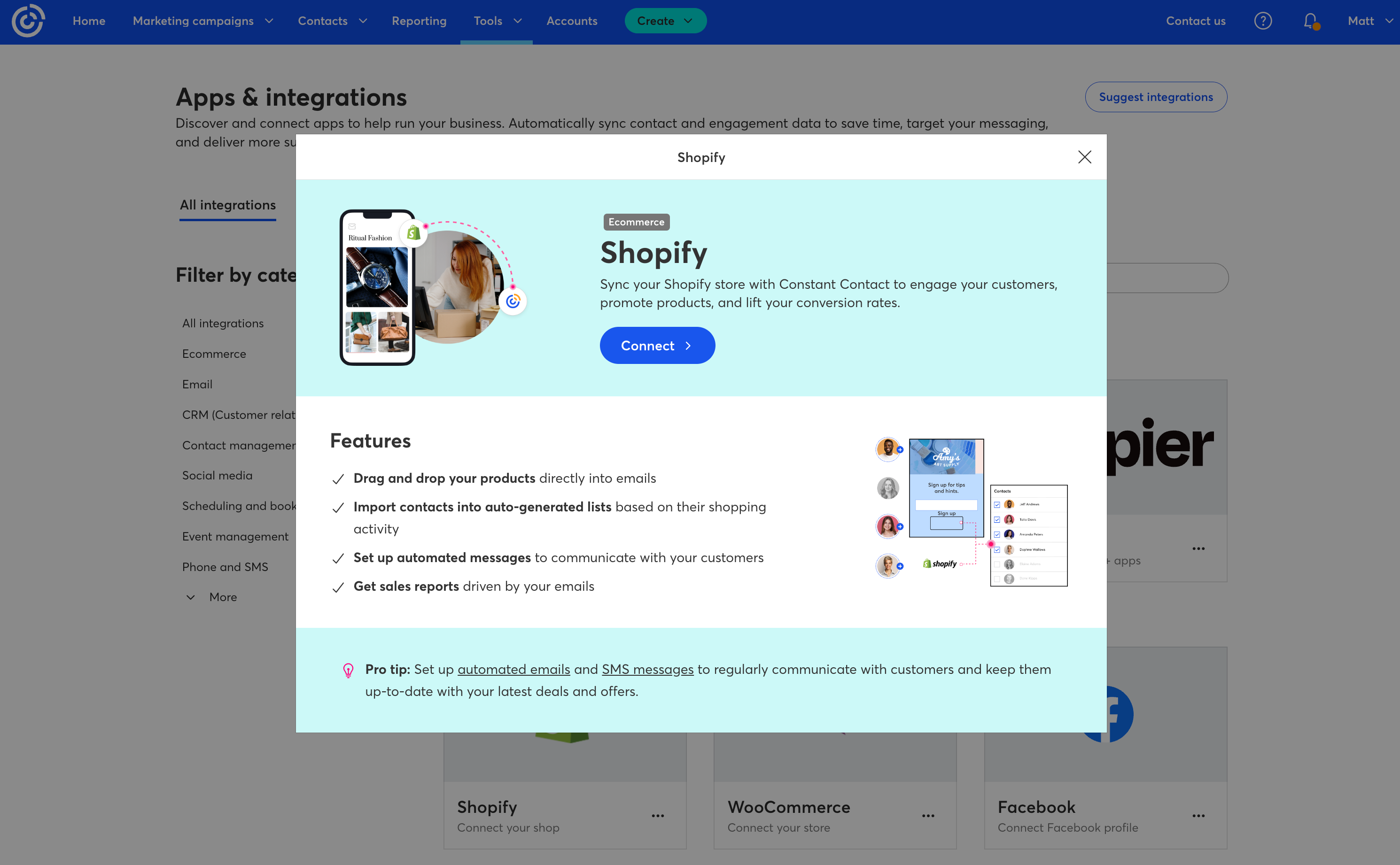Constant Contact Delivers Beyond Email, Adds AI and Automation Features to Power SMB Success

The long-time leader in digital and email marketing continues to focus on innovation, introducing new AI features to help SMBs thrive. Interview with Chief Marketing Officer Laura Goldberg.
Snapshot:
- Laura Goldberg is CMO at Constant Contact, a leading digital marketing platform.
- The company is innovating to make email and integrations easier for SMBs.
- Security and data privacy continue to be a core tenant of its brand promise.
- Constant Contact recently added an AI Content Generator to its popular features.
- On the roadmap, enhancing automation and segmentation are a key focus.
You’ve got mail!
If you’re old enough to remember that iconic soundbite, you might recall the nascent exuberance of receiving “electronic mail.” Of course, that’s back when it was still (somewhat) new, a shiny beacon of possibilities and a game-changer for communication.
Even if the idea of email feels the same today, a lot has changed over the last few decades.
On the upside, we’ve deprecated those arduous CompuServe addresses. Firing off a message no longer requires a modem; it can all be done from a smartphone. And lest we forget, email has also become a ubiquitous component in every digital marketer's toolkit, from personalized campaigns to newsletters.
On the downside, our inboxes have been Biblically flooded. Spam has reached epic proportions, and phishing attacks have become a weak link in the security chain (according to Forbes, there were 500 million of them last year). Add shifting policies and regulatory governance, and it becomes a challenging morass.
These realities might complicate the roadmap for email. But Constant Contact sees more opportunities than challenges.
Since first rolling onto the scene in 1995, the Massachusetts-born tech maven has kept a constant eye on the future. From humble beginnings in a cramped attic to a globally recognized brand, the online marketing platform has become an institution, particularly for small and medium-sized businesses looking to harness the power of email.
What’s perhaps most impressive about Constant Contact is its raw staying power. It is a paragon for longevity in an otherwise volatile tech industry, a testament to its trust and reliability. And while the company was sold to Endurance International in 2015 for $1.1 billion, it has continued operating under its ubiquitous brand and stayed true to its roots – always leading with email.
At the same time, the company has grown beyond its foundational focus to encompass a broader ecosystem of services. This includes a bevy of digital marketing tools like landing page and A/B testing features, lead gen and CRM capabilities, SMS and social media marketing apps, and more.
I recently spoke with Laura Goldberg, Constant Contact’s Chief Marketing Officer, about the irreplaceable role of email as part of an integrated marketing stack, and how her company’s focus on delivering simple yet powerful tools to SMBs is unshakeable.
Laura also shared how their new AI features are enabling users to do more with their digital and email marketing – and how Contact Contact’s approach is not about the tech, but the people and businesses it empowers.
A legacy of focus on SMBs
A seasoned marketer, Laura has spent the last decade working almost exclusively with SMBs, particularly at companies committed to servicing that market tier. As Chief Revenue and Marketing Officer at Kabbage – an SMB-focused financial platform under the AMEX umbrella – she helped small businesses simplify cash flow management with a portfolio of digital solutions.
What Laura loves most about this segment is guiding small businesses through key challenges and helping them achieve success. This centers around demystifying complexity, so a business owner can focus on what really matters.
That passion continues to drive her work at Constant Contact.
“Whether it's marketing, setting up an LLC, or needing a line of credit, it's not why they got into the world of small business,” she explained. “So how do we build a product or service that can help someone who may not be an expert in a field to be really effective?”
In the case of digital marketing, this has never been more apropos. Most people know how to use basic email. But scaling that into campaigns and integrated programs? That can be far more complicated for less tech-savvy entrepreneurs.
"Whether it's marketing, setting up an LLC, or needing a line of credit, it's not why they got into the world of small business. So how do we build a product or service that can help someone who may not be an expert in a field to be really effective?”
This is where Constant Contact shines: enabling small businesses to harness the potential of digital marketing with ease. Email is certainly a big part of it, but the company’s expanded ecosystem of services helps SMBs reach customers in new and exciting ways.
“Constant Contact is a digital marketing platform,” she said. “We lead with email, but that's sort of the ‘entry’ point if you will, and we can we really work to combine your marketing across all channels – email, social marketing, SMS – where you can engage in building relationships with your customers.”
While the focus on SMBs is crystal clear, I asked Laura about the enterprise side of the ledger. After all, many large businesses use Constant Contact as the email layer of a composable stack. In some cases, they might have “grown up” with the technology and never left – but in most cases, it’s a testament to the ease of use and effectiveness of the platform.
“We absolutely have some bigger customers that are enterprise-level or mid-market,” she explained. “But we’re solely focused on [providing] SMBs a marketing platform that’s easy to use and grow with. If you're a solopreneur, or just starting out, it should be simple to send emails and texts, post on social media, and even integrate your Shopify, WooCommerce, and BigCommerce – all in one place. As you get more sophisticated, we have packages that allow you to do more, like segmenting your audiences and setting up custom automations to track revenue from your emails.”
Making integrations easier
Going deeper around the commerce layer, I asked Laura how easy it is to connect shopping carts from third-party platforms with Constant Contact’s email capabilities. Turns out there’s a lot more functionality under the hood, including some personalization features that are simple yet slick.
“It's pretty easy to integrate shopping carts,” she explained. “Customers from your e-commerce platform are populated into your email list, along with their history. So, if you only buy red sweaters, then I know I should only market red sweaters to you, or let you know when we have a sale on red sweaters. It lets you take that data.”
And it is, in fact, really easy to make it all work. With over 6,000 integrations, Constant Contact offers a mega-library of connectors to a world of applications – many of which can be added with just a few clicks.

In the case of Shopify, simple online documentation provides step-by-step instructions for getting it all flowing in no time flat.
One of the biggest benefits of Constant Contact is the access to metrics and analytics. This has long been a core feature of the platform, providing users with details like delivery and open rates. But with a commerce integration like Shopify, you go beyond abandoned carts and see what an email produces in revenue and sales.
As far as integrations go, commerce is just the tip of the iceberg. With a deep bench of best-of-breed tools at your disposal, there are even more opportunities for automation.
“We have integrations with platforms like Canva,” Laura said. “So, if you have all your brand assets and design elements there, you can easily bring them into your emails or social posts. We’ve also integrated with Vimeo, if you’re a video-heavy brand and want to feature that kind of content. And on the B2B side, we even have integrations with HubSpot and other sales CRMs as well.”
Security and privacy are job zero
Short of sounding too macabre, the death of third-party cookies is wreaking havoc on marketers. Add in GDPR, CCPA, and other regulatory redlines, and businesses are under significant pressure to ensure data security and privacy. And with so much sinister email lurking around inboxes, trust is on the tip of everyone's tongue.
I asked Laura how this critical relationship with trust has shaped Constant Contact’s posture in the market, and how they’re addressing bigger ticket security challenges – so small businesses don’t have to sweat it.
“I'm so happy you asked me this, because nobody ever asks me this,” she said. “It’s who we are. Yes, we have the best delivery rates in the business to the inbox, but we also have the best ways to filter spam. We keep our IPs pristine. We make sure that your emails and communications get to the right inbox. It’s one of the primary pillars of our brand, what we stand for and really care about – and we do everything we can so the customer doesn't have to think about that.”
Despite its best efforts, Laura reinforced that there are always limits, and both Google and Yahoo are constantly changing the rules that govern customer data. This is where Constant Contact’s commitment to the customer relationship – to trust – really comes in.
“We work with our customers to ensure they're compliant and that their emails continue to be delivered,” Laura reinforced. “It’s what we do. And if we need you to do something [on your end], we're going to walk you through it. We're going to make it as easy as possible. And we're going to make sure it's impactful to your business.”
AI is an ingredient, not a feature
As I relayed to Laura, I feel a bit more like an AI Critic these days. The impact of artificial intelligence on the digital experience economy is undeniable, and Constant Contact – like its peers – has been working diligently to harness its potential.
Of course, generative AI has obvious applications for an email platform. After all, it’s digital marketers and content creators writing subject lines and body copy. But when you think about the average small business user, the power of AI can take on a whole new dimension of value, even if they’re unfamiliar or intimidated by tools like ChatGPT.
When I finally broached everyone’s soup du jour of 2023, it was apropos to hear Laura serve up Constant Contact’s AI strategy in a perfect dish.
“We try not to market it so much,” she relayed. “AI is an ingredient, not a feature. Right? It's the how, not the what. Yes, it's AI that's powering this feature or that feature, but let's talk about the feature itself and how it benefits the customer, and try and keep the lingo to the side.”
As Laura described, Constant Contact is using AI in a lot of places. While the latest innovations have included tools like a content generator, she was quick to point out that this isn't the company’s first “AI rodeo.”
“We have an internal spam filter that’s 100% built with AI and machine learning," she said. "We've been using AI in our own tools that the customer may never see, but it’s making them more successful.”
Laura pointed out that while everyone across the digital marketing category is offering some manner of content generation, Constant Contact is leveraging a “treasure trove” of history to pull from, allowing them to determine what's most effective. This gives users more relevant ideas and suggestions for overcoming writer’s block and creating more compelling email and marketing content.
Using Constant Contact's AI Content Generator
When it comes to AI features in CMS, DXP, and digital marketing platforms, I’ve experienced almost everything at this point – from Canva’s Magic Write to Kontent.ai’s native gen AI features. Without question, Constant Contact's is one of the simplest.
First and foremost, the interface is incredibly clean and lightweight. No frills, and definitely no complexity. While that might seem less robust, it's designed to be intuitive to the small business user – and as such, only prompts for basic announcements in a single input field.
During a self-propelled demo, I added my own text blurb about an Italian restaurant running a special (it was lunchtime, what can I say?) and in seconds, it rendered some clever email text. It was short, and needed a bit of tweaking, but I was able to manually edit at the next step.
I also tried the fully formatted email template as an option, and sure enough, I was served a basic structure ready to be customized with logos and other attributes. Once approved, I was able to add it to my email workflow and schedule my campaign.

“I think there's real power in solving that blank piece of paper problem,” she said. “Imagine a small business owner, and maybe their first job isn’t marketing. They might stare at a blank email with no direction. We just had a great quote from a customer who runs a farm stand, and they said, ‘Oh my god, you guys tell me 45 different ways to say come to my farm stand on Saturday.’ I laughed, but you know, that help is huge.”
Laura shared a bit more about the roadmap and where AI is being focused now and in the future. A big part of the strategy is to continue enhancing Constant Contact’s automation and segmentation, particularly around connection points with other ecosystems like social media.
“Maybe you buy an ad on Facebook,” she explained, “and you want to send a text two minutes before and see exactly what recommended actions are the next step based on your history of what's been successful and driven the most response and revenue.”
Those are smart applications for AI, all supporting the delivery of the right message at the right time to the right customer through the right channel.
Constantly seeking innovation
I asked Laura what’s next for Constant Contact, specifically as the digital landscape becomes more complex. It’s worth noting that the company realigned its product offerings in the middle of 2023 – which she described as a really big move.
“There's a lot of exciting things coming down the pipe,” she said. “We have new features and functionality, and it's all focused on helping our customers grow, whatever that means for them. And it’s making tools like email easier to use, and then really building on that marketing platform to get them to the next level, helping them get closer to their customers and market more effectively.”
To help deliver on that mission, the company has made several strategic acquisitions to help complete its market vision. This includes SharpSpring, a provider of sales automation and CRM software. The added channel of capabilities has helped Constant Contact capture greater market share and enhance its stack of product offerings.
As far as advancing its global footprint and enriching brand awareness, the company also purchased Vision6 – an Australian-based email and SMS marketing platform – providing a gateway to that market.
There’s no question that AI is influencing the roadmap for this long-standing brand. But as Laura described, these new technologies are simply how Constant Contact delivers success for SMBs. The why and the what is all about translating the value for the customer.
“You can't turn on the news or watch a TV show without hearing about AI,” she said. “Our customers are curious, but we can't just say, ‘hey, use our AI feature’ because they don't know what that means. Small businesses are people, so we’re putting AI in context for them.”
These days, we could all use a dose of AI context. Thankfully, Constant Contact is getting the right message to our collective inbox.
